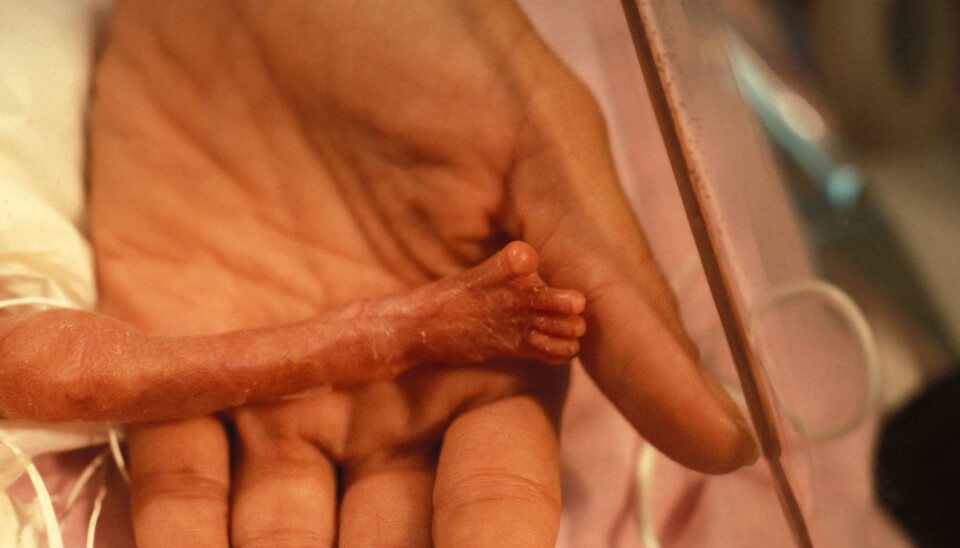An article from University of Tromsø – The Arctic University of Norway

11 hours of parental training increases babies' intelligence
A short training program for parents with premature children can lead to increased intelligence in the child, along with fewer behavioural problems.
Denne artikkelen er over ti år gammel og kan inneholde utdatert informasjon.
Previous research has shown that children who are born prematurely - with birth weights under two kilos - can have increased learning difficulties in mathematics and reading.
They may struggle with sentence structures, score low on IQ tests and have behavioural problems such as hyperactivity, difficulties concentrating and shyness.
Now, a new project on premature babies, undertaken by the University of Tromsø and the University Hospital of Northern Norway (UNN) shows that these negative trends can be reversed by providing new parents of premature babies an eleven-hour course in how to understand their new-borns.
Unclear body language
"Parents of premature infants are often anxious and uncertain. Premature babies are in fact difficult to understand," says Marianne Nordhov, chief at the UNN neonatal intensive care unit.
The babies have unclear body language, make less eye contact and it can be difficult to interpret the signals they send.
Nordhov has done a study where 72 parents of premature children received instruction from a specially trained nurse.
The parents were given one hour of daily instruction in the last week before their baby was discharged from the hospital, and home visits when the baby was six and twelve months of age.
The instruction, which was based on the Vermont model - see fact box, placed an emphasis on understanding the premature baby's forms of expression.
Nordhov explains that the parents learned how to interpret their baby's breathing patterns, movements and changes in skin colour. These are important signals that help hospital staff and parents understand a premature baby.
The Premature Project also had a control group of 74 premature infants whose parents were offered routine follow-up.
Increased Intelligence
Nordhov said when the children was three years old they were tested using a trend test, which is a precursor to the IQ test.
Results showed that the children whose parents had been taught using the Vermont model scored noticeably higher than the children in the control group. The differences were even greater when the children were given IQ tests when they were five years old.
Today, these children are eleven years old and will soon be tested again.
More confident parents
But how can teaching parents to understand baby body language lead to such results?
Nordhov has a hypothesis.
“It is quite amazing that eleven hours of instruction results in such strong effects over the long term," concludes the paediatrician.
According to her the reason is likely that this knowledge eases the burden on parents.
The parents of premature babies can easily become anxious, insecure and worried. The stress and worry of the parents can persist and may lead to interactions that devolve into a negative spiral. In addition, some parents struggle with guilt.
“The training makes parents feel more secure, they feel more optimistic, and these positive effects are transferred to their children,” Nordhov says.
Fewer behavioural problems
Parents who received the instruction also reported that they experienced less stress and were more sensitive in their attitudes during the child's upbringing.
"The parents have an authoritative parenting style. They are warm and empathic, but also set limits. At five years of age, their kids have fewer behavioural problems than the control group," says Nordhov.
The children have less hyperactivity and aggression. Mothers report less shyness and thought disorders in girls, in particular. The kids function better socially.
Her hope is that these results can have an impact on the children's relationship to school and family over the long term.
New insight
Currently, no one has done a similar study of premature children, but a hospital in Norway has introduced parts of the model to their follow-up of premature infants.
Nordhov and colleagues have also applied a lot of the method's components at UNN, and they're now working to establish this as an offer to parents with premature infants.
“We feel that we have helped to bring new knowledge forward," she says.
Scientific links
- Nordhov: A randomised clinical trial on the impact of early intervention on parental child-rearing attitudes and cognitive, motor and behavioral outcomes in preterm infants, PhD dissertation, University of Tromsø, 2011.
- Nordhov m.fl.: A randomized study of the impact of a sensitizing intervention on the child-rearing attitudes of parents of low birth weight preterm infants, Scandinavian Journal of Psychology, Volume 51, Issue 5, pages 385–391, October 2010, doi: 10.1111/






























